This is particularly important to me in Outdoor Education because the difference between being the best, or not, can come with serious consequences. Outdoor Education provides real opportunities for students to take healthy risks and it is paramount that the people supporting them are meeting or exceeding the industry standards. This desire led me to a recent professional development opportunity of attaining my Level 3 Guide Certification with the Sea Kayak Guides Alliance of BC (SKGABC), which culminated with a demanding three-day long examination in the exposed waters of Clayoquot Sound.
The Sea Kayak Guides Alliance was created in 1993, after a tragic incident on a commercially guided sea kayak expedition in Haida Gwaii sparked industry concern and the desire for a higher level of standards and accountability. Since then the Alliance has grown into one of the foremost leaders for sea kayak guiding not only in BC, but Canada and beyond.
The Alliance certifies guides to four different levels: Level One, Assistant Overnight Guide, Level 2 and finally Level 3. In order to be eligible to take my Level 3 exam, I had to log over 80 professional sea kayaking days, including 50 overnight days as a certified Level 2 Guide in addition to holding a number of certifications including 80hr Wilderness First Aid, CPR and VHF Operators Certificate.
Meeting on Friday morning, our group was comprised of six Level 3 Guide Candidates and two Examiners. When we all arrived at the First Street kayak launch in downtown Tofino the exam was underway and wouldn’t conclude until our final debriefs with the Examiners on Sunday afternoon. Even before we were on the water the Examiners were evaluating us on our packing techniques, gear choices, access to safety gear and pre-trip planning.
The exam consisted of a variety of testing methods from scenarios, verbal exams and demonstrations to a good old-fashioned written test. Paddling Techniques in Surf and Current, Rescue Techniques, Leadership and Judgement, Navigation, Weather Theory, Emergency Signaling, Environmental Impact Awareness and Campcraft were all put to the test over the three days. The biggest difference between the Level 2 and 3 Guide exams is that aside from being held to a higher standard for the Level 3 Exam you must perform all of these skills in much more challenging conditions that come with exposed “Class 3” Waters. Class 3 waters are defined by SKGABC as: “Exposed water, sparsely populated areas with more committing crossings, moderate to strong currents with turbulence, moderate to strong wind effects, ocean swells, difficult landings, surf-beaches.”
One of my favourite components of the exam came after a long day on the water, where we had been rotating through candidates’ navigation assessments, in which you had to lead the group around the exposed coastal waters on the outside Vargas Island and identify a specific rock selected by examiners off the chart. After landing through the surf the timer started. You had 15 minutes maximum to grab the supplies out of your boat and to complete the following: a hypothermia treatment set-up, start a fire, boil water and set up a solid tarp. It’s a tough challenge but a rewarding one to complete.
The crux of the exam for most candidates is the practical scenario where a variety of incidents unfold in challenging sea conditions and your leadership and judgment as well as rescue techniques are put to the test. My scenario culminated with a simulated dislocated shoulder in very rough conditions where managing the group while simultaneously dealing with the incident was paramount. Once the injured paddler was back in their boat, I had to work to get them—who were now unable to paddle—and the rest of the group to shore safely through the crashing surf before planning out an evacuation.
For me, the most challenging part of the entire process is that by design the Examiners give you no feedback until your final debrief and the moment you learn if you passed or failed. It’s tough to sit with the unknown but it provides valuable time for reflection as you analyze all of your decisions and actions over the three days.
After successfully completing my Level 3 Guide certification I bring an even more dialled set of skills to my job, one that will aid me not only on the water but in the planning, preparation, delivery and support of all outdoor education programs at GNS. I also hope that this ongoing commitment to learning will encourage students to feel inspired as lifelong learners as they continue down their own individual educational pathways.





